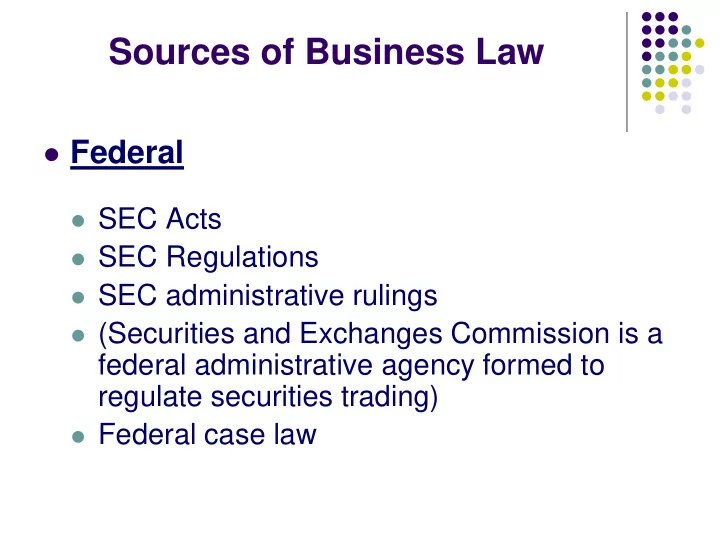

Sources of Business Law Federal SEC Acts SEC Regulations SEC administrative rulings (Securities and Exchanges Commission is a federal administrative agency formed to regulate securities trading) Federal case law
Sources of Business Law State All states have detailed state codes that deal with corporations and other business associations Examples of key state codes: Delaware Corporate Code New York Business Corporation Law California Corporations code State Case Law; especially Delaware
Sources of Business Law The Uniforms Acts Uniform Partnership Act (and Revised Uniform Partnership Act) Uniform Limited Partnership Act Uniform Limited Liability Company Act Various other restatements and uniform acts
Open vs. Close Corporation Definitions: Close (or “Closed”) Corporation: Small group of people entirely own the corporation Open Corporation: The corporation is open to ownership by anyone and is owned by many people
Open vs. Close Corporation Advantages of each corporation type: Close Corporation: controlled by only a few people easier to make decisions limited accountability to shareholders not so heavily regulated Open Corporation: much easier to raise money excellent liquidity (resale market) for the shares
Formation of a Corporation Important Note: Corporations are “creatures” of STATE LAW, not federal law. While federal law may help govern how a corporation must be run, it’s the state law that must be looked to in determining its formation and existence. Formation requires 3 elements: People Paper Acts
Formation: People The person who actually starts the corporation is called the “incorporator” . The incorporator need not own any part of the corporation or even be an officer of the corporation. Anybody that is of age (usually 18) and mentally competent can be an incorporator. Jurisdictions are split as to whether a business entity may be an incorporator.
People Relevant to a Corporation Shareholders: owners of the company Directors: (i.e. Board of Directors) General managers of the corporation Officers: Managers of the day-to-day operations of the corporation
QUIZ TIME!
Formation: Paper Articles of Incorporation are required for every corporation to be formed The Articles are a contract between the shareholder, the incorporators and the state of incorporation Articles must contain: Company’s name and address of its place of business The names and addresses of each incorporator Purposes of the corporation (i.e., what types of businesses it will engage in) Authorized stock issuance and capital structure of the corporation (including classes of stock, if applicable) Duration of the Corporation’s existence (if there is none, it’s assumed to be perpetual) Some states require corporations to designate an agent for service of process
Formation: Paper Corporate Bylaws These are not required; but can be adopted at any time. The are done after the Articles are filed and they discuss a variety of issues, such as voting procedure, contents of the board of directors, etc. Bylaws usually can only be added, amended or repealed by a shareholder vote; but they can also sometimes be done by the directors themselves The corporation must also issue stock certificates, where applicable There is also the requirement that an out of state company register before doing business in a state
Formation: Acts Required for incorporation: Notarized signatures of all incorporators Filing with the correct state organization and payment of required filing fees Organizational Meeting After the filing of the Articles, the incorporators meet to: Elect the initial directors Adopt initial bylaws for the corporation
Recommend
More recommend